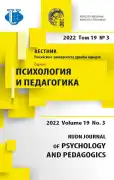Moral Foundations for the Feelings of Shame and Pride Regarding the Native Country
- Authors: Sychev O.A.1, Nestik T.A.2
-
Affiliations:
- Shukshin Altai State University for Humanities and Pedagogy
- Institute of Psychology of Russian Academy of Sciences
- Issue: Vol 19, No 3 (2022)
- Pages: 528-549
- Section: PERSONALITY AND CONTEMPORARY CHALLENGES
- URL: https://journal-vniispk.ru/2313-1683/article/view/326096
- DOI: https://doi.org/10.22363/2313-1683-2022-19-3-528-549
- ID: 326096
Cite item
Full Text
Abstract
The feelings of shame and pride regarding the native country are important in the context of the problem of civic identity; therefore, they are of growing interest on the part of sociologists and psychologists. Given the moral nature of these emotions, their analysis based on one of the most authoritative approaches in the psychology of morality, moral foundations theory, seems relevant and justified. The purpose of this study was to analyze the moral foundations for the feelings of shame and pride regarding the native country. The online survey involved 752 subjects (49.9% men) aged 16-73 (mean age M = 42, SD = 10.87). A new version of the Moral Foundations Questionnaire (MFQ-2) was used to assess the moral foundations. The feelings of shame and pride regarding the native country were assessed using a questionnaire tested in previous sociological and psychological studies. Data processing was carried out using exploratory factor analysis, linear regression analysis and analysis of variance (ANOVA). The results of the regression analysis on the factors of shame and pride regarding the native country showed that the moral foundations play an important role in these feelings among the inhabitants of Russia. However, a specific set of predictors is determined by what exactly is the subject of pride or shame. In general, the moral foundations of loyalty and authority are of the greatest importance for pride, while liberty and equity are most important for shame regarding the native country. Using the latent profile analysis, we identified typical profiles of moral foundations associated with age. A small group (14% of the sample) of relatively young respondents with an individualistic profile of moral foundations demonstrated a significant predominance of shame over pride regarding their native country. The other two groups with a traditionalist and a moderate profiles of moral foundations were characterized by a balance (or approximate equality) of pride and shame regarding their native country. The results of the study contribute to a deeper understanding of the role of the moral factors of patriotic education based on the formation of a feeling of pride in the country.
Keywords
About the authors
Oleg A. Sychev
Shukshin Altai State University for Humanities and Pedagogy
Author for correspondence.
Email: osn1@mail.ru
ORCID iD: 0000-0002-0373-6916
Ph.D. in Psychology, Senior Researcher
53 Vladimira Korolenko St, Biysk, 659333, Russian FederationTimofei A. Nestik
Institute of Psychology of Russian Academy of Sciences
Email: nestik@gmail.com
ORCID iD: 0000-0002-1410-4762
Dr. Sci. (Social Psychol.), Head of the Laboratory of Social and Economic Psychology
13 Yaroslavskaya St, Moscow, 129366, Russian FederationReferences
- Atari, M., Haidt, J., Graham, J., Koleva, S., Stevens, S.T., & Dehghani, M. (2022). Morality beyond the WEIRD: How the nomological network of morality varies across cultures. PsyArXiv. https://doi.org/10.31234/osf.io/q6c9r
- Bergman, L.R., & Trost, K. (2006). The person-oriented versus the variable-oriented approach: Are they complementary, opposites, or exploring different worlds? Merrill-Palmer Quarterly, 52(3), 601–632. https://doi.org/10.1353/mpq.2006.0023
- Graham, J., Haidt, J., Motyl, M., Meindl, P., Iskiwitch, C., & Mooijman, M. (2018). Moral foundations theory: On the advantages of moral pluralism over moral monism. In K. Gray & J. Graham (Eds.), Atlas of Moral Psychology (pp. 211–222). New York: The Guilford Press.
- Graham, J., Nosek, B.A., Haidt, J., Iyer, R., Koleva, S., & Ditto, P.H. (2011). Mapping the moral domain. Journal of Personality and Social Psychology, 101(2), 366–385. https://doi.org/10.1037/a0021847
- Grigoryan, L.K. (2013). Patriotism and nationalism in Russia: Influence on economic independence. Cultural-Historical Psychology, 9(3), 22–31. (In Russ.)
- Haidt, J. (2003). The moral emotions. In R.J. Davidson, K.R. Scherer & H.H. Goldsmith (Eds.), Handbook of affective sciences (pp. 852–870). Oxford: Oxford University Press.
- Harper, C.A., & Rhodes, D. (2021). Reanalysing the factor structure of the moral foundations questionnaire. British Journal of Social Psychology, 60(4), 1303–1329. https://doi.org/10.1111/bjso.12452
- Iyer, R., Koleva, S., Graham, J., Ditto, P., & Haidt, J. (2012). Understanding libertarian morality: The psychological dispositions of self-identified libertarians. PloS ONE, 7(8), e42366. https://doi.org/10.1371/journal.pone.0042366
- Kivikangas, J.M., Fernández-Castilla, B., Järvelä, S., Ravaja, N., & Lönnqvist, J.-E. (2021). Moral foundations and political orientation: Systematic review and meta-analysis. Psychological Bulletin, 147(1), 55–94. https://doi.org/10.1037/bul0000308
- Mercadante, E., Witkower, Z., & Tracy, J.L. (2021). The psychological structure, social consequences, function, and expression of pride experiences. Current Opinion in Behavioral Sciences, 39, 130–135. https://doi.org/10.1016/j.cobeha.2021.03.010
- Nevryuev, A.N., Sychev, O.A., & Sarieva, I.R. (2021). What are young people in Russia proud and ashamed of? The role of basic personal values. Social Psychology and Society, 12(3), 38–58. (In Russ.) https://doi.org/10.17759/sps.2021120304
- Rudolph, U., Schulz, K., & Tscharaktschiew, N. (2013). Moral emotions: An analysis guided by Heider’s naive action analysis. International Journal of Advances in Psychology, 2(2), 69–92.
- Sanina, A.G. (2016). Patriotism of Russians and patriotic education in modern Russia. Sociological Studies, (5), 44–53. (In Russ.)
- Sychev, O.A., & Belousov, K.I. (2021). Association of the individualizing and binding moral foundations with conceptions of motherland in Russia. Siberian Journal of Psychology, (80), 107–127. (In Russ.) https://doi.org/10.17223/17267080/80/6
- Sychev, O.A., Belousov, K.I., Zelyanskaya, N.L., & Anoshkin, I.V. (2021). Attitudes toward migration in Russian: Associations to social identity and moral foundations. Psikhologicheskii Zhurnal, 42(3), 52–63. (In Russ.) https://doi.org/10.31857/s020595920015193-8
- Tajfel, H. (1974). Social identity and intergroup behaviour. Social Science Information, 13(2), 65–93. https://doi.org/10.1177/053901847401300204
- Tracy, J.L., & Robins, R.W. (2006). Appraisal antecedents of shame and guilt: Support for a theoretical model. Personality and Social Psychology Bulletin, 32(10), 1339–1351. https://doi.org/10.1177/0146167206290212
- Weller, B.E., Bowen, N.K., & Faubert, S.J. (2020). Latent class analysis: A guide to best practice. Journal of Black Psychology, 46(4), 287–311. https://doi.org/10.1177/0095798420930932
- Zhuravlev, A.L., & Yurevich, A.V. (2016). Patriotism as an object of psychological research. Psikhologicheskii Zhurnal, 37(3), 88–98. (In Russ.)
Supplementary files









